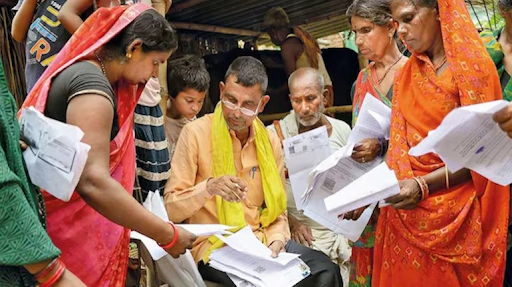Description

Copyright infringement not intended
Picture Courtesy: https://www.thehindu.com/specials/text-and-context/radical-democracy-why-is-it-still-relevant-today/article68197664.ece#:~:text=It%20is%20easier%20to%20sway,by%20the%20radical%20democratic%20perspective.
Context: Radical democracy advocates for individual freedom and social justice by promoting active participation in governance through local committees and the election of independent candidates.
About Radical Democracy
Background
- Periods of societal crisis often highlight the necessity for a radical reorganisation of society. Historically, such crises have driven revolutions and the emergence of new political ideologies. In the 19th century, for example, the shortcomings of liberal democracy under capitalism led to revolutionary movements that sought alternative systems.
- Initially, many revolutionaries were drawn to collectivist doctrines, advocating for transitional dictatorships and centralised economic planning as solutions to capitalist exploitation and democratic inefficacies. However, the degeneration of these collectivist regimes into dictatorships and the concurrent rise of fascism revealed the limitations of such approaches.
- By the end of World War II, disillusionment with dictatorships, whether fascist or communist, had become evident. The massive personal and societal costs of these regimes led many to dismiss dictatorship as a viable alternative. However, combining ambitions for freedom and justice remained a fundamental difficulty.
Manabendra Nath Roy's Radical Democracy
- After World War II, Indian freedom fighter and humanist philosopher Manabendra Nath Roy, along with his Marxist colleagues, developed the theory of radical democracy. This theory sought to provide a solution that combined the aspirations for freedom and justice.
New Humanism: The Philosophical Foundation
- Before outlining the specifics of a radical democratic political economy, Roy and his colleagues emphasised the need for a scientifically consistent philosophical outlook, which they called "new humanism."
- This philosophy is built on the ancient concept of humanism, enriched by contemporary scientific discoveries. They argued that human behaviour, driven by rational thought, could lead to a secular and rational morality.
- Roy highlighted that morality arises from human intelligence and rationality. Thus, human dignity, sovereignty, and creativity should be grounded in rational faculties rather than divine authority.
- In his work "Reason, Romanticism, and Revolution," Roy emphasised the importance of individuals recognizing their rational capabilities and working together to reshape society.
Revolution and Rationality
- Roy highlighted that revolutions are not inevitable but occur when individuals recognize the necessity and possibility of fundamental societal changes. He believed that conscious, rational individuals could cooperate to develop a just and free society.
A Radical Approach to Democracy and Elections
- Roy criticized the superficial nature of democratic processes that merely involve regularized voting. He argued that true democracy requires voters to be informed and capable of independent judgment.
- In a radical democracy, local or regional conferences would enable people to discuss political and economic issues, leading to the selection of independent candidates from among themselves. These candidates would be accountable directly to the electorate, not to political parties.
- Such a system would promote a more organic form of democracy, free from the demagogy and corruption prevalent in traditional party politics. Empowered with mechanisms like the right of recall and referendums, these local democracies would ensure direct control over the state.

Humanist Economics
- Roy's vision for radical democracy included an economic system focused on human needs rather than profit.
- He criticised both capitalist and state-centralised economies for their failure to prioritise the well-being of the population.
- He advocated for modernising agriculture, improving rural infrastructure, and organising rural consumers and industries on a cooperative basis. This approach aimed to increase production, provide employment, and meet the needs of the rural populace.
Comprehensive Social Programs
- Roy's radical democratic program also included provisions for unemployment insurance, old-age pensions, and other social welfare measures. These initiatives would ensure that economic production aligns with human needs, emphasising health, housing, and education.
The Necessity of Radical Democracy
- In contemporary times, the need for freedom and justice remains as crucial as ever. Despite advancements in human knowledge, society faces the risk of disintegration.
- Roy argued that the way forward lies in upholding scientific thought and humanist philosophy. He believed that a society motivated by the ideal of a free and just world, and driven by rational and creative individuals, could create the conditions necessary for true democracy.
|
Radical Democracy
|
|
Critique of Existing Systems
|
●Rejects traditional liberal democracy for failing to address economic inequality and social justice under capitalism.
●Opposes all forms of authoritarianism, even those promising positive outcomes, due to their suppression of individual freedom.
|
|
Core Principles
|
●Scientific Humanism: Emphasises reason and critical thinking as the foundation for morality and social progress.
●Individual Agency: Highlights the importance of individuals taking responsibility for shaping their own destiny and that of society.
●Community Empowerment: Focuses on empowering local communities through "people's committees" that make decisions and select representatives.
|
|
Structure and Participation
|
●Independent Candidates: Local committees choose representatives not beholden to political parties, reducing special interest influence.
●Direct Citizen Participation: Encourages practices like referendums for increased accountability and public empowerment.
●Education and Awareness: Emphasises public education to cultivate critical thinking and informed citizens.
|
|
Economic Justice
|
●Opposes both capitalist and centralised economic models, advocating for a system prioritising human needs and social justice.
●Emphasises modernising agriculture and developing local cooperatives to empower rural populations and create a more equitable distribution of wealth.
●Acknowledges the need for social security measures like unemployment insurance and pensions, designed to meet human needs.
|
|
Relevance
|
●Addresses the crisis of modern governance and lack of citizen engagement, seen as potential causes of global challenges like war and societal breakdown.
●Offers a path forward through reason, critical thinking, and active citizen participation in shaping a better future.
|
Conclusion
- Radical democracy offers a framework for reorganising society in a way that balances freedom and justice. By grounding democracy in rational thought, promoting local political engagement, and prioritising human needs in economic planning, radical democracy aims to create a more equitable and participatory society.
Source:
THE HINDU
WIKIPEDIA
|
PRACTICE QUESTION
Q. Radical democracy emphasises:
A) A strong central government with a focus on national security.
B) Individual freedom and social justice through collective action.
C) Unrestricted free market capitalism for economic development.
D) The importance of religious doctrine in shaping a moral society.
Answer: B
|









